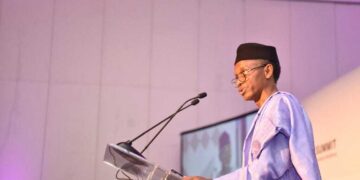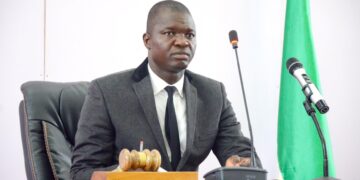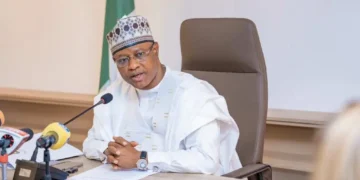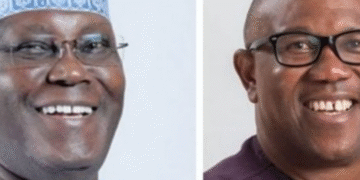By Our Reporters
The move to consolidate power ahead of the 2027 presidential election appears to have begun in earnest, as the Legacy Group of the defunct Congress for Progressive Change (CPC), a key bloc within the ruling All Progressives Congress (APC), is actively positioning itself to produce the party’s next national chairman, Spear News has learned.
The move, according to highly placed sources within the party, is part of a broader strategy to ensure equitable power distribution within the APC’s leadership structure. Though consultations are still ongoing, no final decision is expected until President Bola Ahmed Tinubu, who returned from an official trip yesterday, is fully briefed on the development.
The latest development is coming after a recent visit by the APC National Chairman, Abdullahi Ganduje, and members of the National Working Committee (NWC) to former President Muhammadu Buhari at his residence in Kaduna. That meeting came shortly after a separate visit by former Vice President Atiku Abubakar, ex-Kaduna State Governor Nasir El-Rufai, former Speaker of the House of Representatives Aminu Tambuwal, and other prominent figures from the opposition Peoples Democratic Party (PDP).
Speculations had been rife in recent weeks that the CPC bloc within the APC might be considering an exit from the party after El-Rufai’s defection to the Social Democratic Party (SDP), leaving concerns about a potential political realignment and fears that Buhari’s loyalists within the APC could follow suit.
However, the former president swiftly dispelled such rumours, reaffirming his loyalty to the APC. Buhari categorically emphasised that he cannot betray the party that played a pivotal role in his two successful presidential bids and expressed his continued support for President Tinubu, whom he described as a key ally who was also instrumental to his success.
Despite lingering speculation about the CPC bloc’s future within the APC, a high powered party delegation recently reinforced Buhari’s stance, affirming their continued membership of the ruling party and support for President Bola Ahmed Tinubu.
The members led by a former governor of Nasarawa State, Umaru Al-Makura, pledged their loyalty in a statement last week. The statement was signed by 23 members of the bloc.
“We wish to state categorically that we have neither left the APC nor do we intend to leave. The CPC bloc remains one of the legacy foundations of the APC, and we are resolute in our commitment to the party and its progressive ideals”, the group declared in the statement.
Aside from Mr Al-Makura, other signatories to the statement are a former Katsina governor, Aminu Masari, former Minister of Education, Adamu Adamu, former Senator from Niger State, Ibrahim Musa, former gubernatorial candidate in Jigawa State, Farouk Aliyu, a former Reps member from Yobe State, Almajiri Geidam, Mustafa Salihu, Waziri Bulama.
Nasiru Ladan Argungu, Dominic Alancha, Ayuba Balami, Osita Okechukwu, Okoi Obono-Obla, Lucy Ajayi, Bala Jibri, Uche Ufearoh, Yusuf Salihu, Abubakar Maikudi, Mutallib Badmus, Muhammed Datti, Muhammed Etsu, Jerry Johnson and Alkali Ajikolo.
The CPC founded by former president Muhammadu Buhari, was one of the key opposition parties that merged in 2013 to form the APC, alongside the Action Congress of Nigeria (ACN), All Nigeria Peoples Party (ANPP), a faction of the All Progressives Grand Alliance (APGA), and the new-PDP bloc from the Peoples Democratic Party (PDP).
The merger was a historic move that succeeded in ending the PDP’s 16-year rule in the 2015 elections, bringing Mr Buhari to power. It marked the first time an opposition party unseated an incumbent government.
Despite Buhari’s stance, there are still rumours of dissatisfaction within the APC as disaffected members of the CPC bloc allege marginalisation. While no formal defections have been announced, sources indicate growing discontent. Former Attorney-General of the Federation, Abubakar Malami (SAN), has sought to downplay the position of the Al-Makura led group, asserting that the group lacks the mandate to speak for the CPC. Critics have, however, dismissed Malami’s stance, noting that his root is of the PDP roots and not the original CPC affiliation.
“In the hierarchy of leadership, Malami cannot take precedence over Masari and Almakura. Tanka Almakura has been a governor for eight years. A very experienced business man, a leader of North Central you cannot wish away. Malami came from the PDP”, said Chief Okoi Oboba-Obla, a chieftain of the APC and former national adviser of the CPC.
Insiders reveal that Malami is reportedly aligning with other dissenting CPC figures to join a nascent coalition movement allegedly being orchestrated by former Vice President Atiku Abubakar.
The Battle for Ganduje’s Seat
The tenure of Abdullahi Umar Ganduje as National Chairman of the All Progressives Congress (APC) is set to expire in 2026, following a one-year extension approved by the party’s National Working Committee (NWC). The decision was ratified during an NWC meeting on February 25, 2025, at the Presidential Villa in Abuja, presided over by President Bola Tinubu.
During the meeting, the NWC passed a vote of confidence in Ganduje’s leadership. The party’s National Publicity Secretary, Felix Morka, announced the resolution to journalists after the meeting.
Ganduje, a former governor of Kano State, was appointed APC National Chairman on August 3, 2023, alongside Senator Ajibola Basiru as National Secretary. Their appointments came after the removal of former party leaders, Senators Abdullahi Adamu and Iyiola Omisore, during a National Executive Committee (NEC) meeting.
Adamu and Omisore had initially assumed office in March 2022 at the party’s national convention in Abuja. Under Article 17(1) of the APC Constitution (2022, as amended), party officials are expected to serve a four-year term.
Meanwhile, discussions are gaining momentum about Senator Umaru Tanko Al-Makura, former governor of Nasarawa State, potentially leading the Congress for Progressive Change (CPC) faction within the APC.
His commitment to the party, financial sacrifices, and key role in the formation of the APC make him the ideal candidate to lead the group forward, party ranking members have said.
Chief Okoi Obono-Obla, a former national adviser of the defunct Congress for Progressive Change (CPC), shed light on Al-Makura’s indispensable contributions during the party’s most challenging days a recent interview with Aris News.
Obla said at a time when the CPC had only one governor, Al-Makura himself, and struggled financially, he stepped in with his personal resources to keep the party afloat. Month after month, he provided funds to pay staff salaries at the party secretariat, ensuring that the CPC remained functional despite its limited resources.
“We were financially down and trapped, Almakura as the governor of Nasarawa State was using his personal money to fund CPC. Every month he will give us money to pay staff in the party secretariat”, he said.
He explained that when the historic merger that birthed the APC was being negotiated in 2013, Al-Makura’s role was even more critical. As a member of the CPC merger committee, he financed the committee’s operations, covering hotel accommodations and other logistical needs for months.
Obono-Obla, who served as secretary of the committee, recalled how he regularly collected funds from Al-Makura’s aides to sustain the negotiations. Without his financial backing and steadfast leadership, the merger might never have succeeded, leaving the CPC, and by extension, the APC, without a strong foundation.
“Without him, the merger will not have been possible, because we had nothing, we didn’t have money. ACN had six governors and ANPP had three governors, and CPC had only one governor, and because he is a very dogged person, he was able to put CPC together.
He lamented that despite these sacrifices, Al-Makura has often been sidelined by power brokers within the APC who prefer a more pliable chairman. His independence and refusal to be controlled by any single faction have made him a target, particularly among those who believe the party’s leadership should remain in the hands of a select few.
Obono-Obla pointed out that Al-Makura was denied the chairmanship in the past for precisely this reason he cannot be easily manipulated, and the believe that he was closed to President Tinubu as at then and his loyalty lies with the party’s ideals rather than any individual or group.
He said: “The same people who were fighting him, who were in government then, and because they were not comfortable with him, accused him being close to the current president and denied him chairmanship of APC last time.
“They know that he will not dance to whatever tone they want him to dance, and maybe they think he’s not from the right place, the North Central. Since those boasting of the government are from North West, which is wrong.
“That’s why someone (Malami) could boldly tell my wife, don’t you know that this is our government”
There is also the matter of fairness and zoning, raised. He said the North Central geopolitical zone, where Al-Makura hails from, has been largely overlooked in the distribution of key party positions. With the North West already dominating key government offices, it is only just that the APC’s national chairmanship goes to the North Central, a region that has contributed significantly to the party’s growth. According to him, Al-Makura is not just a regional leader but a nationally respected figure with a track record of bridging divides and fostering unity.
The All Progressives Congress (APC) national convention comes up next year. The North Central geopolitical zone is making a strong push to clinch the party’s national chairmanship position. At the forefront of this move is former Nasarawa State Governor, Senator Umaru Tanko Al-Makura, whose extensive contributions to the party’s formation and growth have positioned him as a leading contender. Although there are speculations that the immediate past governor of Kogi State, Yahaha Bello might throw his hat into the ring, sources said for some reasons, he might not be an option.
However, the APC’s recent decision to extend the tenure of the current National Working Committee (NWC), led by Abdullahi Umar Ganduje, until 2026 stirred unease within party ranks. While some insiders view the extension as a strategic move to consolidate control over the party’s national structure, others argued it has deepened divisions among key power blocs.
With the 2027 general elections looming, the party is keen to avoid internal disruptions that could jeopardise President Bola Tinubu’s re-election bid. Investigations by this newspaper revealed that the extension granted to Ganduje’s NWC may also apply to state chapter executives, ostensibly to prevent contentious elections that could trigger legal battles and further factionalise the party.
Amid these manoeuvres, Al-Makura’s supporters are making a compelling case for his candidacy. A founding pillar of the APC, the former governor played an indispensable role in bankrolling the merger that birthed the party in 2013. At a time when the defunct Congress for Progressive Change (CPC) struggled financially, Al-Makura single-handedly sustained its operations, covering staff salaries and critical merger committee expenses for months.
As the APC weighs its options, the coming months will test whether internal consensus can prevail over competing interests—and whether a seasoned leader like Al-Makura will finally be given the chance to steer the party’s course.













































Discussion about this post